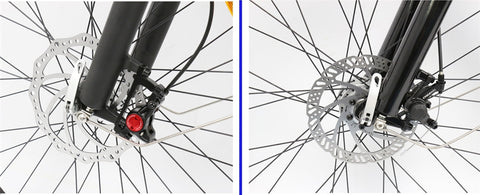Mechanical disc brakes, renowned for their reliability and performance, have become the predominant choice in the cycling industry. Originally popularized by mountain bikes, which were the first to adopt this technology, disc brakes are now found on virtually every type of bicycle. From hybrid and road bikes to urban recreational models, the versatility and superiority of disc brakes, even the more affordable models, are acknowledged universally. Their widespread use extends from everyday commuter bikes to professional race cycles, including those used in prestigious competitions like the Tour de France.
However, not all disc brakes are made in the same way, and there are more factors than just differences in size, use and manufacturer. There are two main types of disc brakes in cycling - mechanical and hydraulic. While the differences are irrelevant to some, there are a number of important qualities that separate one type of disc brake from the other.

Mechanical Disc Brakes
Mechanical disc brakes use the tension generated by clamping the brake lever to pull tight on the wire connecting the lever to the brake caliper, acting on the brake caliper. This causes the brake pads to clamp onto the brake discs, ultimately producing braking force. It is a relatively simple process to work with, but it can achieve considerable braking effect.
Hydraulic Brakes
It is easy to find that hydraulic disc brake e-bikes have a small hydraulic fluid tank on the brake lever to store mineral oil. When you squeeze the brake lever, the force generated by your hand acts on the piston inside, compressing the fluid (i.e. the mineral oil). The fluid is squeezed and flows through the oil pipe to the caliper, which then pushes the piston inside the caliper, driving the brake pads to clamp the disc and finally creating a braking action that stops the machine in motion. This is the principle of operation of hydraulic disc brakes.
Mechanical Disc Brakes: Pros and Cons
Pros:
- More affordable price.
- Easier to repair and maintain as they are simpler
- Replacement parts are easier to find worldwide, as they use the same cables and levers as the rim brakes
Cons
- Low braking force/low efficiency
- As cables stretch, they need to be adjusted more frequently
- More difficult to adjust braking force
- Friction in the brake lines can make them feel less smooth and consistent in operation
- You have to clean them more frequently as the brake lines can become contaminated with dirt or debris
Hydraulic Disc Brakes: Pros and Cons
- More braking power / more efficient
- Smoother operation, as there is less friction in the system.
- Able to produce considerable braking with less force
- Less frequent maintenance and adjustment as the brake is self-adjusting.
Cons
- More expensive
- More difficult to service in the field as they are more complex
- More difficult to maintain as you have to bleed the brake lines occasionally
Differences Between Mechanical vs Hydraulic Disc Brakes
Although both brakes ensure that your e-bike stops quickly, they have their own advantages and disadvantages.
- Braking power
Hydraulic disc brakes tend to produce better braking power than mechanical brakes. This superiority in efficiency showcases the key differences in hydraulic vs mechanical disc brakes. Hydraulic systems amplify the force you apply on the lever, leading to significantly more braking power than you actually exert.
- Pricing
When considering the cost, mechanical disc brakes are cheaper than hydraulic ones. This difference also extends to maintenance; mechanical disc brakes vs hydraulic disc brakes show a considerable cost disparity, with mechanical systems being much more economical over time.
It is more expensive to buy hydraulic disc brakes or a bike that uses them. It is also more expensive to maintain hydraulic disc brakes. You need to bleed the brakes and change the fluid, which requires high-end tools or a trip to the bike shop to do so, which can add to the cost.
- Braking force control and precision
Hydraulic disc brakes ensure superior control over the braking force of your bicycle, a clear advantage when comparing hydraulic or mechanical disc brakes. The minimal force required to activate hydraulic brakes contrasts sharply with the greater effort needed for mechanical disc brakes, which can complicate precise control.
- Parts availability
Availability of spare parts also distinguishes mechanical from hydraulic disc brakes. Mechanical systems share components with conventional rim brakes, making them widely accessible, unlike the specialized parts required for hydraulic systems.
- Operation Smoothness and braking consistency
The hydraulic disc brakes operate more smoothly compared to mechanical disc brakes, illustrating the differences in hydraulic vs mechanical disc brakes in terms of operational consistency and ease.
Some form of friction occurs when the cable of a mechanical disc brake passes through the housing. Because it is an open system, the housing is more likely to become contaminated with dirt, which will create more resistance and the brakes may feel less smooth. Trying to overcome this resistance requires you to apply more force than usual. As a result, the braking is less consistent.But when you have clean and well-set mechanical disc brakes, their operation will also be very smooth and consistent. This will require more effort on your part.
How to choose Disc Brakes
We know that your main concerns are braking distance and performance. But we'd like to point out that both types of braking system have their merits. Hydraulic disc brakes will be better, but in fact both will lock your bike wheels well to produce powerful braking to ensure the safety of the rider. We recommend that you choose which braking system to purchase depending on your needs and budget.
When your bike converted by esoulbike kits to an e-bike, you don't have to worry about going too fast to stop quickly. eouslbike offers two break sensors to match both types of brakes for this purpose. MS-1R for mechanical disc brakes and MS-2R for hydraulic disc brakes.
https://esoulbike.com/products/accessories










